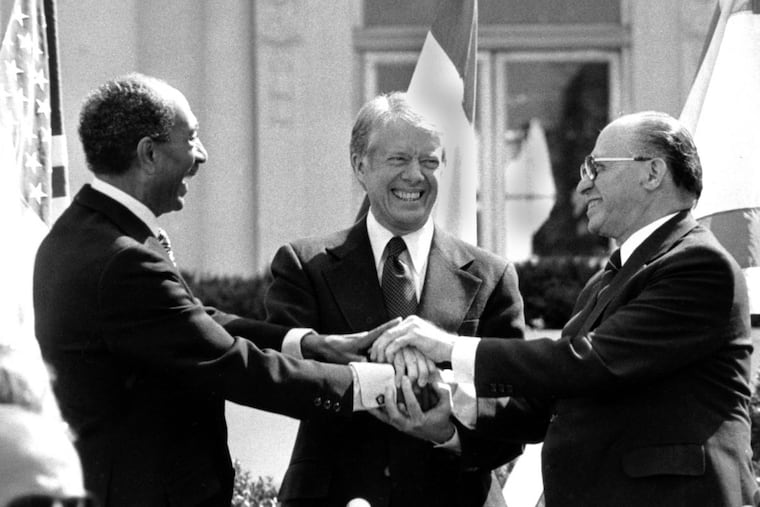40 years ago, Sadat trip to Jerusalem changed the Mideast
Sadat's peace with Israel has stabilized Israel up to the present and reminds us, in times of Mideast chaos, that the unexpected can still happen.

On Nov. 19, 1977, I stood on wooden risers at Ben Gurion International Airport waiting to see if the circling plane carrying Egyptian President Anwar Sadat was really going to land.
Israelis were in a state of shock and disbelief that the head of the largest Arab country had made a historic decision to visit Israel. He was the first Arab leader to do so since the establishment of the Jewish state.
Next to me, an Israeli foreign ministry staffer was sobbing. Another asked me if I thought the Egyptian plane might actually be carrying a bomb that would explode on landing, killing the entire Israeli political leadership, assembled several rows below us. Instead, Sadat disembarked, advanced toward the Israelis, shook hands, and wrapped his arms around the bulky ex-Prime Minister Golda Meir.
Forty years later, as the Mideast implodes, that moment still stands as a turning point for the region. In my office, I keep a framed copy of a poster that was tacked on every Jerusalem building, wall, and light post, displaying Israeli and Egyptian flags topped by the world Peace in English, Arabic, and Hebrew. The Egyptian leader hoped peace would extend to the entire region.
His dream didn't come true. But Sadat's trip opened the door to a broader peace, under the right condition: If Arab and Israeli leaders emerge who have the guts and foresight he did. That holds true for the future, even if the current landscape looks very bleak.
What was so striking about Sadat was that he had a clear vision and was pragmatic about how to get there. Israel's hawkish prime minister, Menachem Begin, also had the courage and pragmatism to agree to return the Sinai to Egypt, the prerequisite to cementing a peace.
(The only Mideast leaders to display such pragmatism since were Jordan's King Hussein, along with Israeli Premiers Yitzhak Rabin and Ehud Olmert, and to a lesser extent, Ehud Barak. Palestinian leader Yasir Arafat did so briefly, but then reverted to the pursuit of illusions.)
Sadat recognized that, after heavy military and economic losses in 1967 and 1973, most of the Egyptian public had lost interest in fighting on behalf of the Palestinians. He believed his army had regained its honor by crossing the Suez Canal in 1973, which ultimately led to his decision that the time was ripe for a dramatic overture to the Israelis.
The Egyptian leader hoped his stunning move would persuade Begin to return all lands captured in 1967 from the Arabs, including Gaza and the West Bank. Begin nixed that idea even before Sadat had concluded his emotional visit to Jerusalem.
Yet that trip created openings, some seized, some not, that deeply affect the stability of the region until today.
On the side of missed chances, I list the opportunity that Sadat's visit did present to the Palestinians. His trip ultimately led to the 1978 Camp David Accords, brokered by President Jimmy Carter, that provided a road map for Palestinian autonomy on the West Bank and Gaza, at a time when there were hardly any Israeli settlements. The accords called for an elected "self-governing authority" and negotiations over final status of those territories. Some West Bank Palestinians believed that elected authority could garner international recognition and pressure on Israel to contemplate the establishment of a Palestinian state.
But the Palestinian Liberation Organization — the "outside" leadership that spoke for the diaspora — was opposed to going this route because it didn't include them. A possible chance to move toward two states side by side was missed at a time when the region was far more stable.
Yet the opportunity seized — Begin's recognition that a signed peace with Egypt was more important than Sinai — has provided Israel with 40 years of stability, by removing the military threat on its southern border. That peace has lasted through Sadat's assassination, the removal of President Hosni Mubarak, the election of a Muslim Brotherhood government, and an effective return to military rule under current President Abdel Fattah el-Sisi. Even though the peace is cold, and Egyptian civilians almost never visit Israel, the military and intelligence cooperation between the two countries is close.
Some see parallels to Sadat with the emergence of Saudi Crown Prince Mohammed bin Salman (MBS), who shares Israel's strategic enmity toward Iran; there are all sorts of rumored contacts between the two countries as well as sharing of military intelligence. The Trump administration hopes MBS might godfather an Arab-Palestinian-Israeli peace.
Yet the youthful MBS lacks Sadat's seasoning and experience, and is operating in a far more fragmented region. Although he takes big chances, he's unlikely to make dramatic public moves toward Israel. Nor is Israel's leadership open to the compromises on the Palestinian issue that the Saudis would require.
Still, as the 40th anniversary of Sadat's visit reminds us, one should never rule out the unexpected. But best to remember the unexpected may produce something better, or something worse.